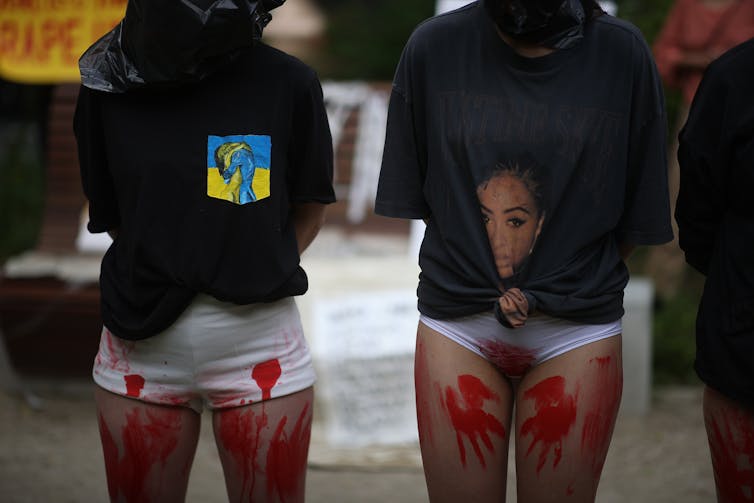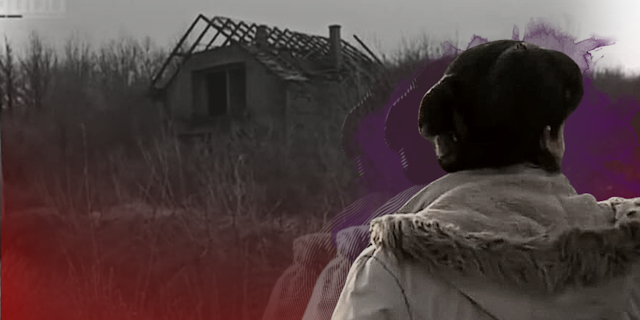I still vividly remember the moment when Lola told me her wartime rapist was not in jail. I had phoned Lola, a Bosnian woman raped during the 1992 war, to discuss how all the challenges she’d faced during the trial had paid off.
I cheerfully said, “Finally, he was prosecuted. Twenty-five years later, but still there is a justice and he is in jail now.”
I expected Lola to share my sentiment, but instead a silence stretched between us. I waited. I realised something was not right, but never expected her next words.
“But he is not in jail. He is free,” Lola said carefully, almost whispering as if I was a child needing to be protected from bad news.
A nightmare
On May 8 1992, according to data collected by war veterans’ associations, Croatian soldiers detained 1,294 Serb civilians from Odžak County in the Posavina region. Among them were Lola and her three young children. At 29, she had become the sole carer of her nine-month-old baby, four-year-old daughter and six-year-old son. Her husband, drafted by the Serb armed forces, was killed in the first few days of the war. In the span of just a few weeks, Lola’s life turned into a nightmare.

The plot of land where the women and children were detained was fenced with barbed wire, becoming a makeshift concentration camp. An armed soldier tore Lola’s daughter from her breast and threw her onto the ground in search of weapons. Lola screamed. The soldiers ripped the baby’s clothes off, asking Lola whether she had hidden weapons in them.
Lola and her children were sent with other women to the surrounding abandoned houses where they were detained. Soldiers would come and go as they wished to these houses, choosing from among the women and taking them to their homes. There, for the next two months, these women were gang-raped. The perpetrators, they say, were members of the special military unit the Fiery Steeds, recruited from the 102nd battalion of the Croatian Defence Council.
During their two months of detention, some 60 women were raped, 42 detainees were killed and the rest were tortured, starved and abused. In 2012, investigations by the judiciary of the Republika Srpska into the crimes committed against Serb civilians from Posavina finally began.

Lola, her sister and other victims gave their statements to investigators. Lola testified that she had been raped by a man named Ilija Jurić and seven other soldiers – members of the Fiery Steeds – while being detained in the camp.
Before the war, Lola, her husband and Jurić had lived in the same neighbourhood and would regularly pass by each other’s houses. (In Bosnia and Herzegovina, neighbours have almost the same significance as extended family).
In 2015 the state court handed down an indictment against Jurić and others. The legal proceedings took two years, with Lola making several trips to the Bosnian capital Sarajevo to testify against indictees. Lola testified that all of the alleged rapists had been wearing camouflage uniforms with Croatian Army emblems and carrying rifles. They used nicknames, and wore balaclavas.
In Lola’s case, after a long battle for justice, only one of the eight wartime rapists, Jurić, was found guilty before the Bosnian courts. In 2017, he was sentenced to six years in jail. The others were acquitted. As can often happen with cases of wartime sexual abuse, the judges were satisfied with the evidence that rape was inflicted, but the identity of the perpetrators could not be proved beyond reasonable doubt.
However, the Bosnian judiciary never executed Jurić’s sentence.
Is this justice?
As I spoke to Lola, after calling her at her home in early 2021, I was confused. “But, he was sentenced, no?” I asked, my mouth dry with anxiety.
“He has never been arrested,” Lola said patiently, but firmly.
My mind was having trouble taking things in.
“No one arrested him and put him into the jail,” she said slowly, in a high-pitched voice to make sure I heard her this time.
There was a feeling of muteness, like my ears were plugged up as if I was underwater. I sank into the chair.
We exchanged a few more words and I promised I would call her again. I hung up the phone, mulling over what Lola had told me.
I remember repeating to myself, “Justice? Is this justice?” I was enraged. I took up pen and paper and made notes, bullet points, a trajectory of her life over the past three decades.
Into thin air
I come from a country ravaged by war. The 1992-95 Bosnian war was fought between former friends and neighbours, and resulted in more than 100,000 deaths. Some 2.5 million people were displaced, 20,000 women were raped, and 800,000 homes were destroyed. I was 19 when the war started. My brother was 22 when drafted into the army and expected to shoot at his compatriots.
One of the key features of the armed conflict in Bosnia and Herzegovina was the pervasive use of rape and sexual violence. Many rapes occurred in camps and other places of detention. The perpetrators were not strangers to their victims. They were their former friends, neighbours, colleagues.

Over the past two decades, I have been studying the long-term effects of wartime violence and in particular sexual violence as a tactic of war. Over the years, I have conducted extensive fieldwork in places where the violence took place. I have conducted interviews with survivors to gain an understanding of how they have coped with trauma and rebuilding their lives in a new postwar state.
I first met Lola in 2014, while doing fieldwork with Serb women victims of wartime rape in Bosnia – the first such study. Serbs generally, regardless of gender, were perceived as “perpetrators” and as such their victimhood had been ignored by the international community. Lola and I stayed in touch over the first few years of my research, and I knew that she’d decided to help authorities to bring charges against Jurić. Once Jurić was prosecuted and sentenced, we lost connection for some years, until I rang her in 2021. What she told me that day prompted me to write a book based on her case, questioning institutional failures to bring those who committed war crimes to justice, and to jail.
By holding those who committed war crimes accountable, the courts signal to the local communities that such violations will not go unpunished. Prosecutions also assist victims in achieving some kind of closure.
But Lola’s rapist simply did not show up to serve his sentence. He has never been summoned to do so. In 2015, he had vanished into thin air, leaving the country. When he was finally found guilty in 2017, Jurić was long gone from the Bosnian jurisdiction.
Only in September 2021 did the Bosnian courts release a warrant for Jurić, for whom they cannot determine a place of residence. Soon after, the International Criminal Police Organisation issued a Red Notice, a request to law enforcement worldwide to locate and provisionally arrest Jurić or extradite him to the Bosnian authorities. At the time of publishing this essay, he is still at large.
For Lola, six years since Jurić was convicted, her fear has not diminished. She still lives in the northeastern region of Bosnia and fears he will track her – or her children – down, to seek revenge for testifying against him.
‘I gave everything for this country’
The International Criminal Tribunal for the former Yugoslavia has indicted 161 individuals for war crimes, genocide and crimes against humanity in the former Yugoslavia. (One of them was Bosnian Serb General Ratko Mladić, who was sentenced to life imprisonment after the judges found him guilty of the 1995 Srebrenica genocide.)
Read more: Ratko Mladic, the 'Butcher of Bosnia', to spend life in prison for genocide and war crimes
In 2002, Bosnia and Herzegovina’s national courts gained jurisdiction over cases that did not involve major political and military figures.
However, the reality before the local national courts in Bosnia has been strikingly different. Around 130 defendants prosecuted for war crimes and crimes against humanity in these courts have not only escaped imprisonment, but simply disappeared after being prosecuted and sentenced. More than a third of these missing people are parties in ongoing cases.
Once they cross international borders, war criminals find a safe haven in countries such as Serbia and Croatia. Croatia is not willing to cooperate with investigations and extradition of its citizens.
Many other cases have been dropped due to lack of evidence and the impossibility of establishing the identity of perpetrators before the criminal courts. Given there are often neither eyewitnesses nor supporting medical records in wartime rape cases, international tribunals have established that a conviction can be based on the victim’s testimony alone.
However, according to TRIAL international, an organisation that fights impunity for international crimes, supporting victims in their quest for justice, certain Bosnian courts have responded to cases lacking corroborating evidence by subjecting victims to “abnormally high standards of credibility and/or acquitting perpetrators”.
Lola felt she was not given space in court to tell her story. When she asked her perpetrator, “Would you do it again?” the judge intervened, shushing her quickly, telling her the question was inappropriate.
She found her whole experience of testifying intimidating and unsatisfactory.
No one helped me financially or emotionally to go through it all … I gave everything for this country, my husband, myself, my children and got nothing … nothing at all … we don’t have enough to survive, we live in a poverty, as beggars … I am afraid, I sometimes panic because of the situation I found myself in… What if something happens to my children or my grandchildren?
She wanted Jurić to give her some rational explanation for his inhumane actions – and to receive some assurance he would never do the same again. She wanted him to take responsibility, to express regret.
But this is precisely what most offenders are advised not to do as it would incriminate them, making them accountable for what they had done.
Jurić never admitted to the allegations against him, and denied he had even been in the detention camp at the time, let alone raped Lola.
Lessons in Ukraine
Although sexual violence in armed conflict has long been used as a weapon of instilling terror and subjugation, the first prosecution of rape as a war crime before the International Criminal Tribunal for the former Yugoslavia did not occur until 1998.
In Ukraine, reports keep coming from areas controlled by Russian troops about sexual violence committed by Russian soldiers against women, men and children. A staggering number of war crime cases – more than 66,000 as of early February – have been reported in Ukraine.

Last week, Oleksandra Matviichuk, head of the Centre for Civil Liberties and a Ukrainian Nobel peace laureate, called for the swift creation of a special tribunal to try Russian president Vladimir Putin and his associates for the crime of aggression in Ukraine, arguing it could have “a cooling effect” on crimes committed by the Russian troops there. She has also asked for international judges and prosecutors to help Ukrainian prosecutors with the growing caseload of alleged war crimes.
Once the war is over, Ukraine’s judiciary will have to choose which ones to prosecute. The number of cases would overwhelm any judicial system, let alone one that has been ravaged by war.
Read more: Civilians are being killed in Ukraine. So, why is investigating war crimes so difficult?
But prosecuting war rapists, while vital, is not enough. Wartime rape and sexual violence are uniquely challenging to address. Cultural taboos and fear of reprisals mean many survivors are hesitant to share their trauma. Prosecutions of rape and sexual violence are rare and complicated.
There must be other transitional justice mechanisms deployed to help countries such as Ukraine and Bosnia deal with the large number of conflict-related sexual violence cases.
Ukraine, for example, could establish reparation mechanisms with a victim-centered focus. A truth commission, the most common non-judicial transitional justice mechanism, could be established once the war is over. Rather than seeking retribution, commissions – such as the ones established in South Africa, Peru and East Timor (to name a few) – are more interested in bringing conflicting parties to reconciliation or at least acceptance of living again, if not with, then next to each other, peacefully.
Fear and stigma
Three decades after the war ended in Bosnia, the judiciary still deals with a backlog of cases. Many perpetrators have died; many served their sentences and some returned to their prewar homes. Some meet their victims or eyewitnesses on the street or in local shops when buying groceries. Some have threatened their victims. Fear and stigma from sexual violence have not disappeared three decades after the crimes were committed. Women are still afraid to talk about their experiences, to testify.
Today, Lola can see Jurić on his Facebook profile. As we talk, she presses her index finger on the screen, and says to me in a hushed voice,
Here he is. These are his details. All correct. Look.
She scrolls back and forth over his personal data.
The date of birth, correct … everything fits. He even proudly put on his public profile that he was in military unit in Odžak.
Jurić is not the only war criminal with a Facebook profile. Lola, meanwhile, still lives in limbo. She has conflicting feelings. She is angry at the judiciary but would still do what she did.
I would go again to the court, I would say everything what I said again. I am not afraid, I am telling the truth always … But I did it not just for me but for everyone, for our children, our future, so it never happens again …
Some excerpts are from the forthcoming book Lola’s War: Rape Without Punishment (Palgrave MacMillan, 2023).

